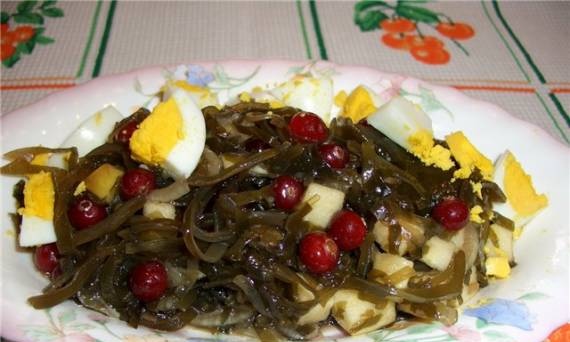|
 There are people who are admirers of seaweed, who often use it to prepare delicious and healthy culinary dishes. But there are also those who, to put it mildly, dislike her. They refer to an unpleasant taste or smell, a slippery surface and assure that it is not at all useful. Is it so? There are people who are admirers of seaweed, who often use it to prepare delicious and healthy culinary dishes. But there are also those who, to put it mildly, dislike her. They refer to an unpleasant taste or smell, a slippery surface and assure that it is not at all useful. Is it so?
Seaweed is the simplified common name for edible algae known scientifically as kelp. It has been used for food and medicine for a long time. Eastern peoples firmly believe that seaweed must be present in their diet. The Japanese eat it every day, the Chinese call it sea ginseng, and the Indians even treat tuberculosis with it!
Laminaria is 80% water, so it is customary to dry it. But, oddly enough, during drying, it does not lose valuable components and retains all the useful properties. The same goes for heat treatment.
Currently, seaweed is widely used in cooking, especially for the preparation of vitamin salads. Moreover, it can act as the main component. There are many seaweed soups in Japanese cuisine. The broth is prepared for them, as a rule, from seafood.
The benefits of seaweed, like any seafood, are determined by the properties of sea water, which contains valuable trace elements.
The main substance in kelp is iodine. It will be no secret to anyone that it is used to treat the thyroid gland. And in any other products, easily assimilated iodine compounds are not enough to quickly replenish its deficiency in the body. It only takes one hundred grams of seaweed to equip the body with a daily norm of iodine.
In addition, algae contains a huge amount of macronutrients and microelements, amino acids and various vitamins. All of these substances are beneficial for maintaining the health of the body. And no vegetable or fruit can compare with it in terms of the number of useful components.
The vegetable fibers that make up seaweed are easy to digest. And salts of alginic acid, increasing in size, absorb excess water. therefore alginates, swelling, increase intestinal activity and relieve constipation.
The polysaccharides that make up seaweed have the ability to reduce excess blood cholesterol.
Having a rich composition, seaweed is a low-calorie product. Therefore, it is used in diets aimed at weight loss.
Thus, when eating seaweed, the 2-in-1 principle applies: food and medicine.
And what is the harm?
For the average person, seaweed is not dangerous at all. Except when it comes from contaminated water. Since it has the ability to absorb both useful and harmful substances from water. When choosing seaweed, you need to clarify where it was obtained.
It is an indisputable fact that frozen or fresh kelp retains more useful properties than canned. And if all kinds of additives are present in it, then most of the valuable substances are lost.
It should be remembered that seaweed is contraindicated for people with individual iodine intolerance, suffering from furunculosis and having chronic forms of rhinitis.
Dudnik D.A.
|
 There are people who are admirers of seaweed, who often use it to prepare delicious and healthy culinary dishes. But there are also those who, to put it mildly, dislike her. They refer to an unpleasant taste or smell, a slippery surface and assure that it is not at all useful. Is it so?
There are people who are admirers of seaweed, who often use it to prepare delicious and healthy culinary dishes. But there are also those who, to put it mildly, dislike her. They refer to an unpleasant taste or smell, a slippery surface and assure that it is not at all useful. Is it so?



